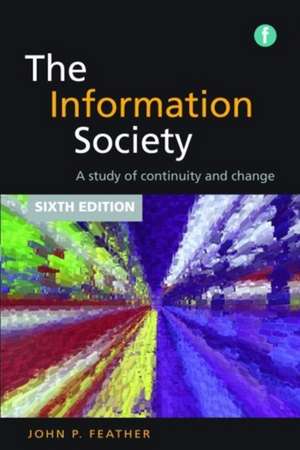The Information Society: A study of continuity and change
Autor John Featheren Limba Engleză Hardback – sep 2023
This latest edition of this standard work has been fully updated to take account of the changing landscape and technological developments since 2008. The social Web, or Web 2.0, is now embedded in daily life, and some of its applications have become the most popular forms of communication system. Even the predominance of email – one of the most familiar manifestations of the information revolution – is now threatened by texting and the use of such applications as Twitter. The ways in which we expect to interact with information – and how much we are willing to pay for access to it – are throwing up new opportunities and debates.
Preț: 732.24 lei
Preț vechi: 1171.00 lei
-37% Nou
140.13€ • 145.41$ • 117.12£
Carte nepublicată încă
Specificații
ISBN-10: 1783303182
Pagini: 240
Dimensiuni: 156 x 234 x 19 mm
Greutate: 0.22 kg
Ediția:6
Editura: Facet Publishing
Colecția Facet Publishing
Locul publicării:Oxford, United Kingdom
Public țintă
Professional Practice & DevelopmentCuprins
Notă biografică
Descriere
What is information? Who are the information rich and who are the information poor? How can there be equality of access for users in the light of the political, economic and cultural pressures that are placed upon information creators, gatherers and keepers? Set against a broad historical backdrop, The Information Society explores the information revolution that continues to gather pace, as the understanding and management of information becomes even more important in a world where data can be transmitted in a split second. This latest edition of this standard work has been fully updated to take account of the changing landscape and technological developments since 2008. The social Web, or Web 2.0, is now embedded in daily life, and some of its applications have become the most popular forms of communication system.
Even the predominance of email - one of the most familiar manifestations of the information revolution - is now threatened by texting and the use of such applications as Twitter. The ways in which we expect to interact with information - and how much we are willing to pay for access to it - are throwing up new opportunities and debates. At a societal level, as the quantity of personal digitized information continues to grow exponentially, so do both the benefits of exploiting it and the dangers of misusing it.
The use of ICT to make government more accessible has to be balanced against the use of technologies that enable the state to be more vigilant or more intrusive, according to one's point of view. Behind all of this lies further technical change: the massive expansion of connectivity to high-speed broadband networks; the phased abandonment of analogue broadcasting; and above all the widespread availability and use of sophisticated multi-functional mobile devices which carry voice, video and data and which can themselves be carried anywhere. The implications for daily life, for education, for work and for social and political relationships are massive.
Readership: All information professionals and students on courses on information, librarianship and communications studies, where an understanding of the nature of the information society is an essential underpinning of more advanced work.
